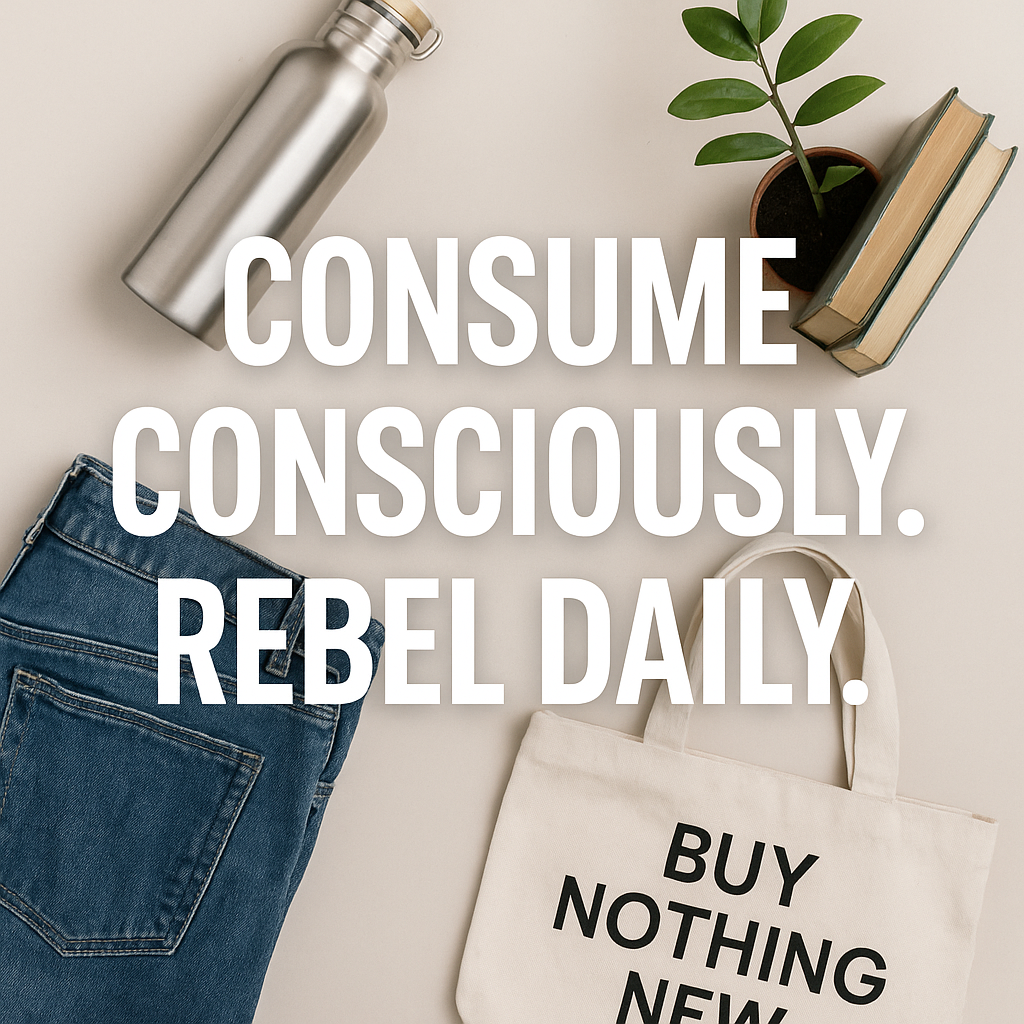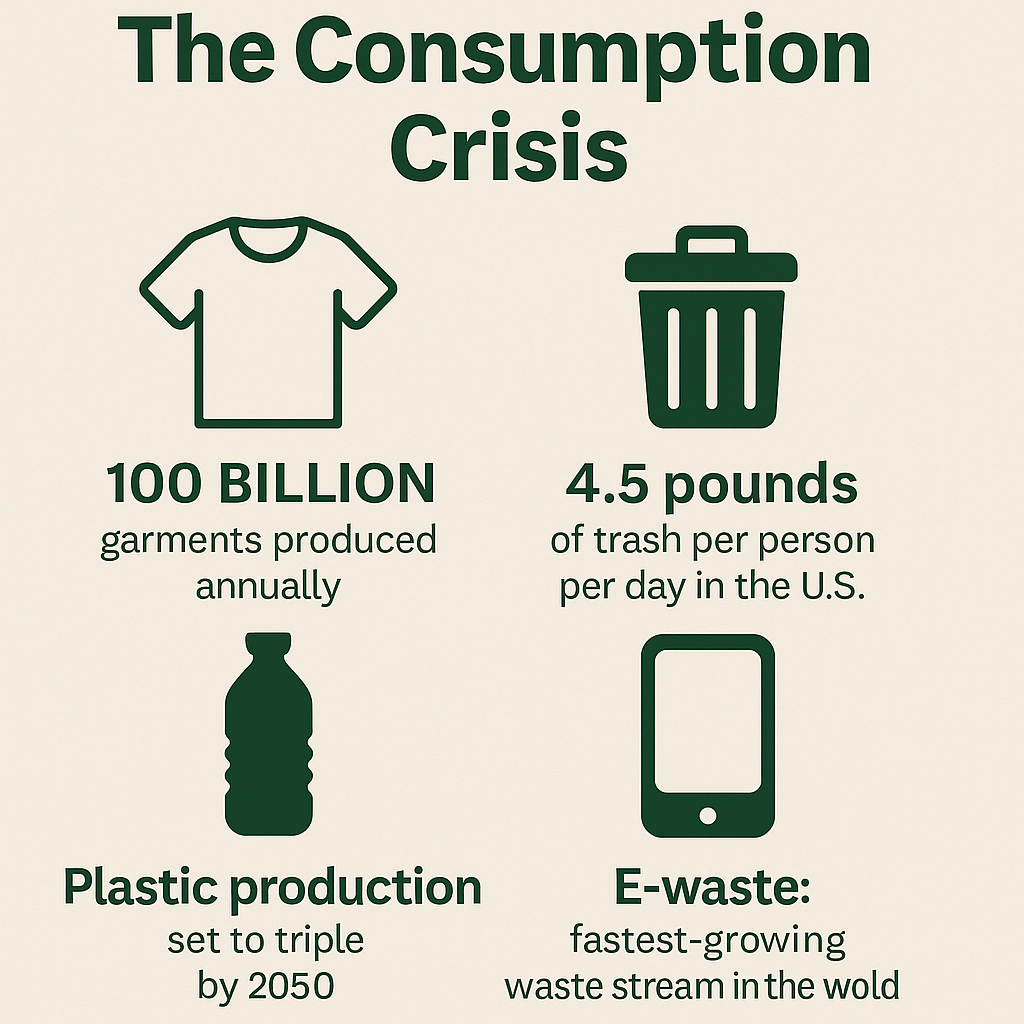Why We Need School for Consumers
The Class We Never Took
We’ve all sat through years of schooling. We learned algebra and chemistry, studied literature, memorized historical events, and maybe even pursued advanced degrees. But not once did anyone sit us down and said: here’s how to be a consumer.
And yet, consumption is one of the most consistent actions of our lives. We shop every week, scroll Amazon late at night, upgrade our phones, buy new clothes, order dinner through apps, and stock our homes with an endless stream of products. Consumption is the water we swim in—it touches our communities, our economy, and our planet. But because we’ve never been taught to consume consciously, we’ve drifted into habits that are harming us as much as they’re harming the Earth.
That’s why we need a school for consumers. A place to unlearn the patterns that no longer serve us, to reclaim power from systems built to exploit us, and to reimagine what it means to live well.
“We’ve learned how to solve equations, but not how to solve overconsumption.”
The Consumption Crisis
Look around and it’s obvious: consumption has gone off the rails. Fast fashion churns out more than 100 billion garments every year while millions of tons of clothing end up in landfills. Each American throws away about four and a half pounds of trash daily. Plastic production is set to triple by 2050, even as our oceans are already overwhelmed with bottles, bags, and straws. Electronics pile up as e-waste becomes the fastest-growing waste stream in the world.
We like to tell ourselves that shopping is harmless, even fun. But every purchase carries weight. That “free two-day shipping” isn’t free at all—it comes with carbon emissions, warehouse labor struggles, and packaging waste that will outlive us. Advertisements whisper that more is always better, while the result is cluttered homes, maxed-out credit cards, and a warming planet.
“Every purchase carries weight—even the ones that arrive in a smiling box.”
What We Were Never Taught
Part of the problem is simply that we were never taught to question it. In school, we mastered quadratic equations but not the basics of credit cards. We studied Shakespeare but not how to spot greenwashing. We learned how to analyze poetry but not how to analyze a supply chain.
This is the curriculum gap nobody talks about. We left school without knowing how to recognize marketing manipulation, without skills to repair or reuse, and without awareness of how our consumption choices affect labor, climate, and waste. We weren’t taught to see ourselves as consumers with power. Instead, we were conditioned to go along with a system designed to keep us spending.
The Business of Keeping Us Uneducated
None of this is an accident. Companies benefit from our ignorance.
Think about it: if we all knew that making a single pair of jeans requires more than a thousand gallons of water, would we buy so many? If we understood the human cost of fast fashion or the environmental toll of endless plastic bottles, would we keep consuming at the same rate? Probably not.
That’s why industries thrive on keeping us in the dark. Planned obsolescence ensures our phones and laptops don’t last as long as they could. Trend cycles in fashion spin faster every season to make what’s in your closet feel outdated. And digital ads track us with such precision that we rarely pause to consider whether we even want what’s being pushed on us.
“They spend billions shaping our desires, but almost nothing shaping our discernment.”
The Emotional Side of Consumption
It’s not only systemic—it’s personal. Consumption is emotional. Shopping feels good in the moment. Clicking “buy now” delivers a rush of dopamine, and there’s real satisfaction when someone compliments a new outfit or gadget. But the high doesn’t last. Soon guilt creeps in. Did I spend too much? Do I even need this? Where will I put it?
This cycle—buy, regret, discard, repeat—is exhausting. And it leaves many of us with homes full of stuff but an emptiness that never seems satisfied.
Mindful consumption isn’t about deprivation. It’s about liberation. It’s about stepping out of the cycle and realizing that less stuff can mean less stress. It’s about discovering that freedom lies not in more, but in enough.
What a School for Consumers Would Teach
So what would a “school for consumers” actually look like? Instead of teaching us to earn more so we can spend more, it would help us break free from the trap altogether. Imagine a curriculum where the courses included Mindful Consumption 101, The Buy Nothing New Challenge, and Repair & Reuse Basics. Imagine classes on how to recognize greenwashing, how to map a supply chain, and how to resist the constant pull of digital advertising.
This wouldn’t be about perfection or grades. It would be about skills, awareness, and community. It would be about equipping ordinary people to see through the noise, reclaim their choices, and find joy in alternatives. It would be about learning to live with less—and realizing that less can be better.
“We don’t need more degrees—we need a degree in consuming less.”
Stories of Resistance
The good news? These lessons already exist in the wild.
The Buy Nothing Project connects neighbors to give and receive items freely, cutting waste while building community. Thrift and resale culture are booming, especially among Gen Z, who are rejecting fast fashion in favor of vintage treasures. France has introduced “Right to Repair” laws, forcing tech companies to make parts available so products last longer. And in Japan, the ancient practice of kintsugi—repairing broken pottery with gold—transforms damage into beauty rather than waste.
These stories remind us that resistance isn’t just possible—it’s joyful. When we step outside the consumption treadmill, we find creativity, connection, and meaning waiting for us.
Why Now
The urgency couldn’t be clearer. Climate scientists warn us that we have only a short window to reduce emissions and slow global warming. Plastic waste is set to double, fast fashion is accelerating, and mental health crises tied to consumer culture are rising.
But there’s also hope. Millennials and Gen Z are already questioning the system. They’re tired of the endless Amazon boxes at their door, tired of closets full of clothes they don’t wear, tired of being sold to constantly. The cultural moment is ripe for change. What’s missing is structure, guidance, and community. That’s where a school for consumers comes in.
A Movement, Not Just a Blog
Mindful Consumer School isn’t just a website. It’s a movement. It’s a place to give people the tools to question consumption, the courage to resist it, and the language to talk about it.
Because alone, our choices can feel small. Skipping one purchase or reusing one bottle doesn’t seem like much. But when millions of us make those choices together, the ripple effect becomes impossible to ignore. This is about turning small daily actions—refusing fast fashion, repairing an appliance, borrowing instead of buying—into a collective rebellion.
“We’re not here to shop better. We’re here to shop less.”
Time for Class to Begin
For too long, we’ve been uneducated as consumers. The stakes are too high to stay that way.
We need a school for consumers—a place where we can learn to shop less, live more, and reclaim power from a system built to keep us buying. This isn’t about guilt. It’s about progress. It’s about rewriting the rules together, creating new habits, and building a future that lasts.
Class is in session. The question is: are you ready?
Join the Movement
If you’re nodding along, it’s time to take the next step. Subscribe to The Rebel Consumer, our weekly email filled with stories, tools, and challenges to help you consume consciously and rebel daily. This is where we put ideas into action—where small choices add up, and where together, we learn how to change everything.
👉 [Subscribe to The Rebel Consumer]


